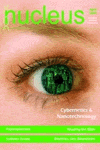Britain has become one of the world's most secular societies, according to a recent poll. The survey was commissioned by the BBC for a documentary entitled 'What the world thinks about God'. Only 67% of those interviewed admitted that they believed in a god or other higher power, in contrast to 100% of respondents in Nigeria and 91% in the USA. In most of the countries covered, well over 80% had some belief. Another poll by the Bible Society alarmingly demonstrated that almost a third of Christians don't read the Bible outside of church services and only 16% of regular churchgoers read the Bible daily. At first glance, the results of these two polls seem unrelated. But are they?
When we commissioned the main articles for this edition of Nucleus, it wasn't with any particular theme in mind. However, as I read through them, I am struck by the strong common message that comes across - we need the Bible. Only by letting God's eternal Word illuminate our path (Ps 119:105) and by having a correct attitude to it (2 Tim 2:15), can we hope to know his will for our lives and stay on the right track, personally and corporately.
However, CMF staffworker Becky Brain reports that the thing students ask her about most frequently is Bible reading and how to establish a regular pattern of devotions (pp20-25). With this in mind she outlines why we should be trying to make a habit of studying God's Word regularly, and offers tips to help you get down to it.
The statistics above suggest that our society has made a pretty good attempt at shaking off its Judaeo-Christian roots. In particular it's no longer desirable to be accountable to anyone, or anything, except yourself. This lies at the heart of postmodernism. It's all too easy for us to spot the faults here and dismiss it as a 'secular' problem but, as Marcus Honeysett asks on pp26-33, could it also be affecting the way we live our lives as Christians, as we try to do things our own way?
Avoiding accountability and ignoring external moral standards offers great scope for pushing man's capabilities to the limit. This is particularly true in bioethics. On pp2-4 Andrew Fergusson looks at whether this absence of boundaries will really be helpful in the long term, whilst Philippa Taylor (pp12-19) explores the expanding fields of cybernetics and nanotechnology, which promise to present us with opportunities to modify humanity, taking our race to an altogether new level and bringing with it many new ethical quandaries.
In conclusion, this edition presents a brief snapshot of attitudes that pervade our society and warns us that we need to guard against these pitfalls as Christians. I have been challenged and encouraged in equal measure. I hope you will be too.
When we commissioned the main articles for this edition of Nucleus, it wasn't with any particular theme in mind. However, as I read through them, I am struck by the strong common message that comes across - we need the Bible. Only by letting God's eternal Word illuminate our path (Ps 119:105) and by having a correct attitude to it (2 Tim 2:15), can we hope to know his will for our lives and stay on the right track, personally and corporately.
However, CMF staffworker Becky Brain reports that the thing students ask her about most frequently is Bible reading and how to establish a regular pattern of devotions (pp20-25). With this in mind she outlines why we should be trying to make a habit of studying God's Word regularly, and offers tips to help you get down to it.
The statistics above suggest that our society has made a pretty good attempt at shaking off its Judaeo-Christian roots. In particular it's no longer desirable to be accountable to anyone, or anything, except yourself. This lies at the heart of postmodernism. It's all too easy for us to spot the faults here and dismiss it as a 'secular' problem but, as Marcus Honeysett asks on pp26-33, could it also be affecting the way we live our lives as Christians, as we try to do things our own way?
Avoiding accountability and ignoring external moral standards offers great scope for pushing man's capabilities to the limit. This is particularly true in bioethics. On pp2-4 Andrew Fergusson looks at whether this absence of boundaries will really be helpful in the long term, whilst Philippa Taylor (pp12-19) explores the expanding fields of cybernetics and nanotechnology, which promise to present us with opportunities to modify humanity, taking our race to an altogether new level and bringing with it many new ethical quandaries.
In conclusion, this edition presents a brief snapshot of attitudes that pervade our society and warns us that we need to guard against these pitfalls as Christians. I have been challenged and encouraged in equal measure. I hope you will be too.
































